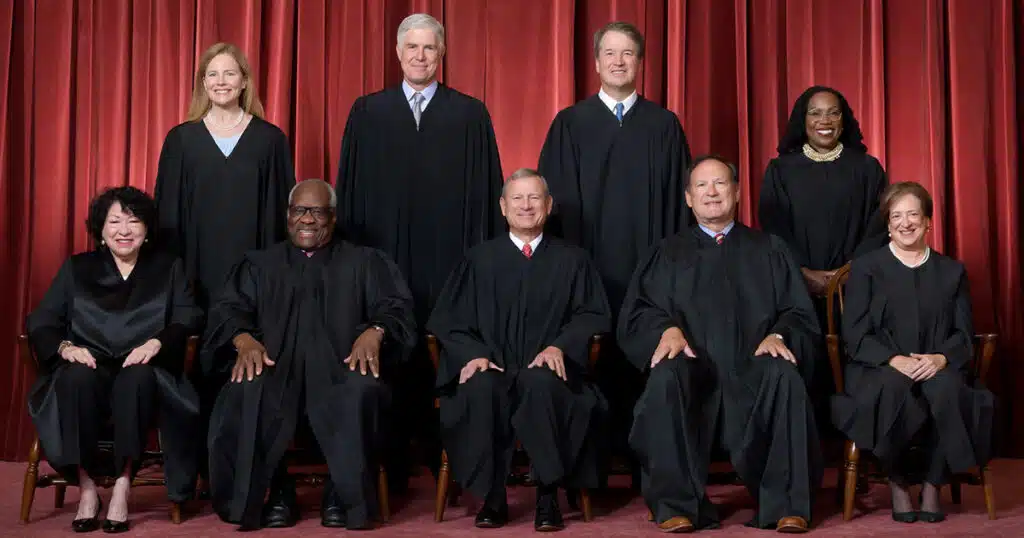
Recent Supreme Court Decisions Attack the ‘Deep State,’ Will Help Restore the Constitutional Order
Two recent U. S. Supreme Court cases will help return our national government to the correct constitutional order. These two cases involve, firstly, the immunity of a president from criminal prosecution and, secondly, the practice—now ended by the Supreme Court—of having federal courts defer to agency interpretations of that agency’s rules and regulations.
The first case is Trump. v. United States and involves the charges brought against Pres. Trump for his alleged actions on Jan. 6, 2020. Jack Smith, the highly partisan Special Counsel (who’s very appointment as special counsel is legally suspect) alleged that Pres. Trump supposedly conspired to overturn the election by “spreading knowingly false claims of election fraud to obstruct the collecting, counting and certifying of the election results.” Trump argued, in response, that a president has absolute immunity from criminal prosecution for actions performed within the “outer perimeter” of his official responsibilities and that the allegations fall within the core of his official duties.
This case is especially significant because of the lawfare waged against President Trump—i.e. the weaponizing of our courts and legal system to try to damage a political opponent as Pres. Biden has orchestrated against Trump—that the Supreme Court, for the first time in our nation’s history, was forced to address the issue of presidential immunity from criminal prosecution.
So, what did the Court do?
The Supreme Court laid down “a rule for the ages.” The Court stated that “under our constitutional structure of separated powers, the nature of Presidential power entitles a former President to absolute immunity from criminal prosecution for actions within his core constitutional duties and … presumptive immunity from prosecution for all of his official acts” (i.e., “outer perimeter”). The Court also held that “unofficial” acts enjoy no immunity.
Obviously, the need for immunity from criminal prosecution stems from the fact that a president must often make snap, real time judgments with incomplete information on a host of issues affecting many things, including national security. We cannot have a president looking over his shoulder—overwhelmed with worry—that some action he feels needs to be taken on behalf of the country may subject him to criminal charges after his presidency. (Biden and Pres. Obama should be grateful for this ruling, as well).
The Supreme Court sent the case back to the federal district court to determine what alleged acts of Pres. Trump on Jan. 6 were “official” and “unofficial” acts.
I think there will be very little left of these charges against President Trump once the district court jumps through the legal and analytical hoops the Supreme Court laid out in this decision.
The second case is Loper Bright Enterprises v. Raimondo, Secretary of Commerce. In its decision the Supreme Court overruled a 1984 decision, Chevron, that required federal courts to defer to an agency’s “reasonable interpretation” of an ambiguous statute that those agencies administer. The reason this is so important is because the enormous federal agencies in our country impose the actual law we live under, and that is wrong. These career bureaucrats were elected by no one.
The Loper Court held that “the Administrative Procedure Act requires courts to exercise their independent judgment in deciding whether an agency has acted within its statutory authority, and courts may not defer to an agency interpretation of the law simply because a statute is ambiguous.”
It’s important that a federal court, and not an administrative law judge (ALJ) in the very agency itself, decide these cases because an ALJ employed by and within a given agency is invariably going to favor the position of the agency. A given agency simply cannot be allowed to serve as “judge, jury and executioner” in our constitutional scheme.
The dissent in the case argued it is a mistake not to defer to agency interpretation of rules and regulations because “some interpretive issues arising in the regulatory context involve scientific or technical subject matter. Agencies have expertise in those areas; courts do not.” To which Chief Justice Roberts succinctly replied “agencies have no special competence in resolving statutory ambiguities. Courts do.”
These two cases are helping restore the appropriate constitutional order. They continue the critical process of removing power from unelected government bureaucrats who falsely believe they have the power to do many things—including exercise legislative policy making authority in their various agencies—that the Constitution expressly reserves to the Congress.



